12 Best Brown Sugar Substitutes for Baking and Cooking
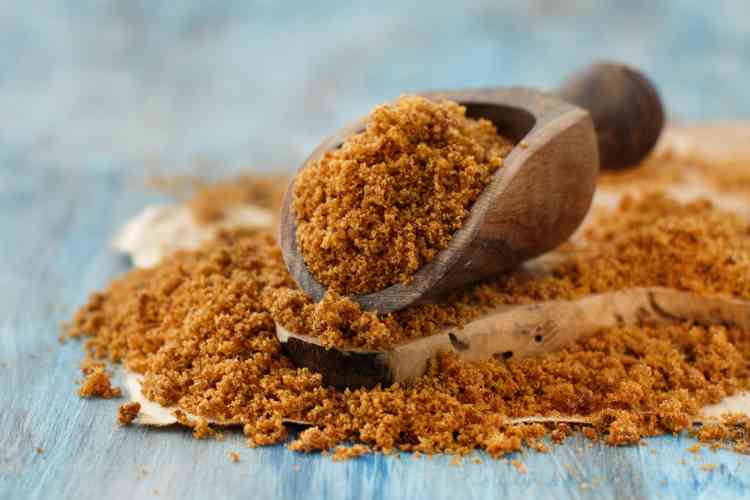
Looking for the perfect brown sugar substitute? Brown sugar is a pantry staple for baking, required for everything from chewy chocolate chip cookies to wholesome granola. Its unique, rich molasses flavor is used in candies, barbecue sauces, honey glazes and oatmeal recipes.
Although most kitchens keep a bag on hand, you might find yourself in a pinch if you run out right when you need it. Never fear, we’ve rounded up a few brown sugar substitutes and alternatives that will work perfectly if you’re fresh out.
These brown sugar alternatives are also an easy fix if your previously opened bag has hardened into a solid mass — a common problem if your brown sugar stash is exposed to too much moisture or air for too long between uses. Even better, many of these options are already in your kitchen.
Jump to Section
What Is Brown Sugar?
Most varieties of refined sugar come from sugar cane or sugar beets, which are harvested, cleaned, chopped and then crushed to extract a sweet liquid. From this liquid, raw molasses is created. White sugar is produced by separating, drying and milling the crystallized portion of this process until most of the molasses is removed.
Brown sugar, however, retains some of that molasses, which gives it its signature color and rich flavor. Commercially, this is often achieved by adding molasses back into refined white sugar. Varying amounts of molasses create different types: light brown sugar (approximately 3.5% molasses), dark brown sugar (about 6.5% molasses) and muscovado — a coarse, higher-molasses variety from Barbados that’s often used in teas and baked goods.
Sugar and sugar cane farming were initially brought back to Europe from Asia by Christopher Columbus in the late 1400s. Fervor and demand for the sweet substance across Europe and the American colonies would eventually manifest in sugar cane becoming a chief crop of the Caribbean region’s similar climate.
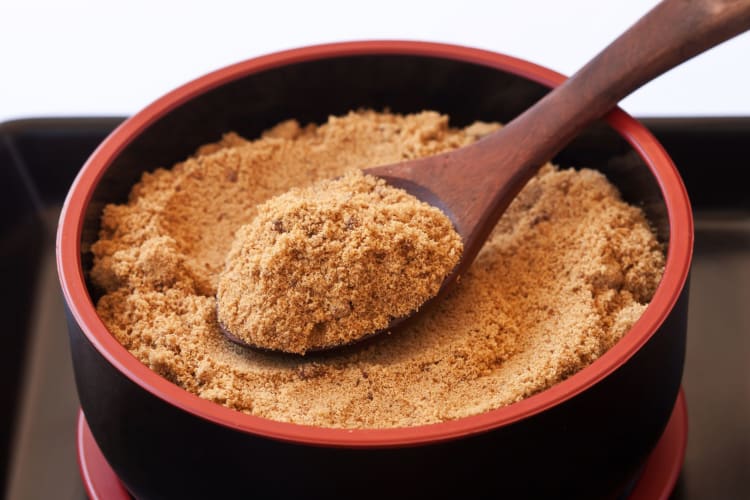
Purpose of Brown Sugar in Cooking and Baking
Brown sugar is known for its rich, deep, molasses flavor and is often a favorite ingredient in baking, providing both flavor and texture. Thanks to its higher molasses content, baked goods made with brown sugar — especially cookies — often turn out chewier and more tender.
Brown sugar is also a popular ingredient for glazes and sauces, providing a sweetness that complements meat and fruits. It’s also a common ingredient in candy-making and makes a tasty topping for oatmeal, granola and other breakfast favorites.
Looking for ways to create delectable recipes using brown sugar or brown sugar substitutes? Try a cooking class!
You’ll find cooking classes near you, including those in New Orleans and Portland, as well as many other cities across the U.S. and beyond. You can also find a wealth of online cooking classes to enjoy from your very own kitchen.
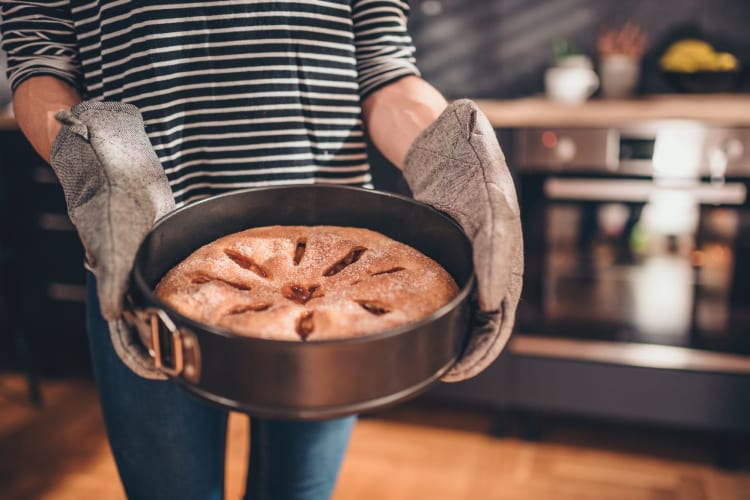
12 Brown Sugar Substitutes
1. White Sugar
Can white sugar be substituted for brown? Well, when it comes to brown sugar substitutes, the most readily available option is white sugar. You can swap it in a 1:1 ratio for brown sugar without altering the sweetness level.
Keep in mind that white sugar lacks the molasses content, so your finished product may be less moist and a bit crisper than if you used brown sugar.
Use This: If your pantry is missing brown sugar. Your cookies might be slightly crispier, but it’s a quick and convenient solution whenever you need a reliable brown sugar substitute.
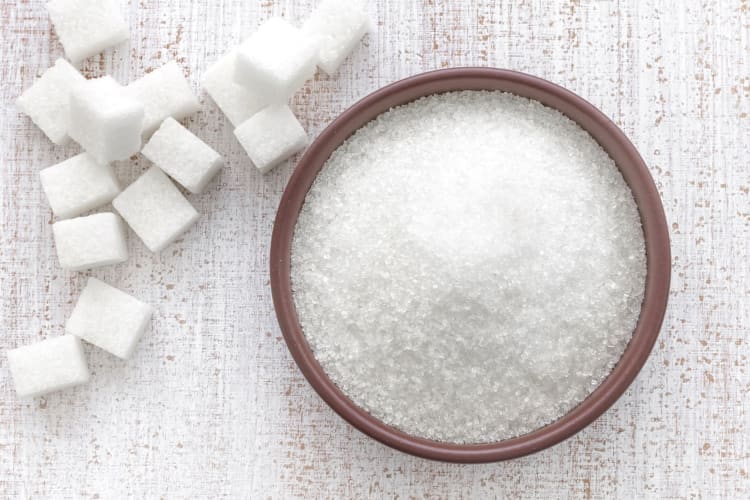
2. White Sugar and a Liquid Sweetener
If you want to reintroduce some moisture and a hint of molasses-like flavor, stir in a small amount of a liquid sweetener — such as maple syrup, agave nectar or honey — before mixing. This technique is especially useful if you’re searching for a brown sugar substitute for cookies but still want that signature chewiness.
Use This: Whenever you need a quick brown sugar substitute. Liquid sweeteners lend moisture and flavor to your baked goods while helping you achieve a soft, chewy texture.
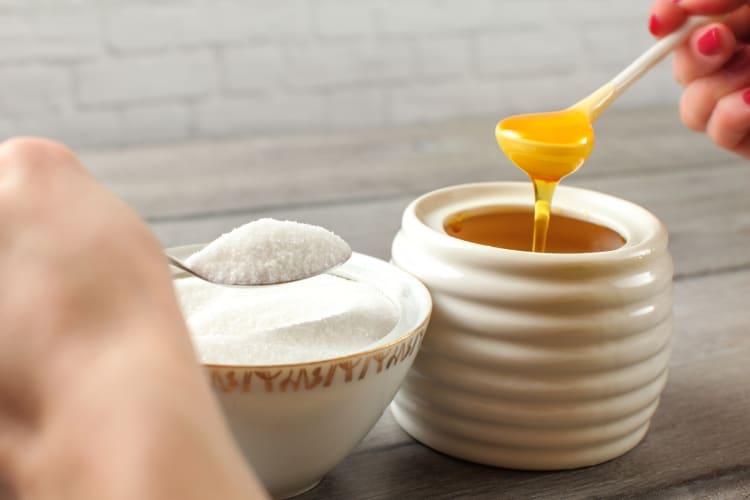
3. Honey, Agave Nectar or Maple Syrup
While combining them with white sugar may produce an effect similar to brown sugar, these sweet liquids can also be a brown sugar substitute all on their own, particularly if the finished product is a liquid like a glaze or sauce. You can substitute 2/3 cup of these liquids for a cup of brown sugar, but to keep the right consistency, reduce other liquid ingredients (such as milk or water) by 2 tablespoons.
If you’re aiming for a brown sugar replacement in baking, be mindful that honey, agave and maple syrup, although good brown sugar substitutes, will add extra moisture and a slightly different flavor profile.
Use This: Whether you’re glazing meat or baking cookies. Just remember to adjust the other liquids to this brown sugar sub in your recipe to prevent an overly wet or dense outcome.

4. White Sugar and Molasses
Looking for one of the best brown sugar substitutes? Try making your own by combining granulated white sugar with molasses — because that’s essentially all brown sugar is. For a light brown sugar substitute, start with 1 cup of white sugar and mix in 1 tablespoon of molasses; for the sub for dark brown sugar, use 2 tablespoons of molasses per cup of sugar. Blend until evenly combined (a fork or mixer works great).
Use This: If you need a substitute for brown sugar in cookies, this DIY method is ideal — especially if you love a chewy texture.
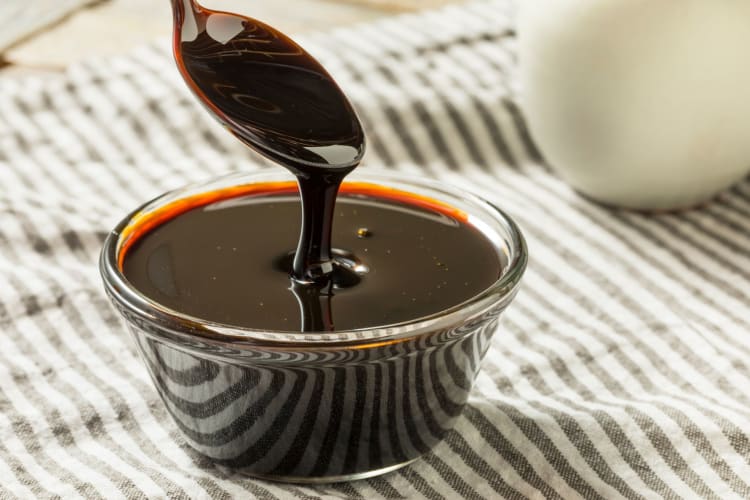
5. Muscovado
A denser, solid version of brown sugar in its least refined form, muscovado is often used to sweeten tea in the Caribbean, but it can also be used as a substitute for other brown sugar products.
It is stickier and clumpier than regular brown sugar due to the high molasses content, but it can be blended into other ingredients to create a smoother texture. It makes an easy dark brown sugar substitute in particular.
It works as a 1:1 alternative to brown sugar in most recipes, though you may notice a slightly darker color and richer taste. Because muscovado tends to clump, be sure to blend it thoroughly with the other ingredients to avoid lumps.
Use This: If you’re after a brown sugar substitute that packs extra flavor, or you need a brown sugar replacement in cookies for a chewier texture.
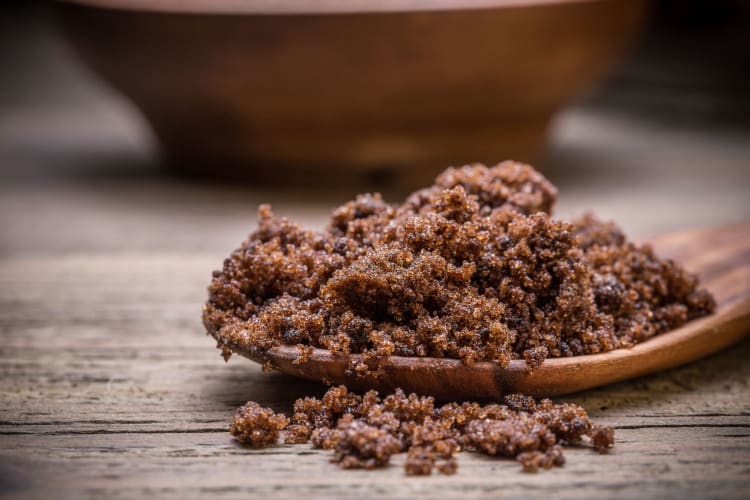
6. Coconut Sugar
Sometimes billed as a healthier alternative to other types of sugars, coconut sugar comes from the sap of the coconut palm. Although its calorie count is roughly on par with white sugar, it contains less fructose.
Its caramel-like hue and subtle sweetness make it an appealing brown sugar substitute, especially when you want a flavor profile similar to white sugar.
Coconut sugar can replace brown sugar at a 1:1 ratio, but it tends to be drier and denser. To keep baked goods moist — especially if you’re wondering what to use in place of brown sugar — try adding a little extra fat (like butter or oil) or an additional splash of liquid.
Use This: If you’re looking for a brown sugar replacement in cookies, but prefer a more natural sweetener that has been shown to have a lower glycemic index than standard white sugar.
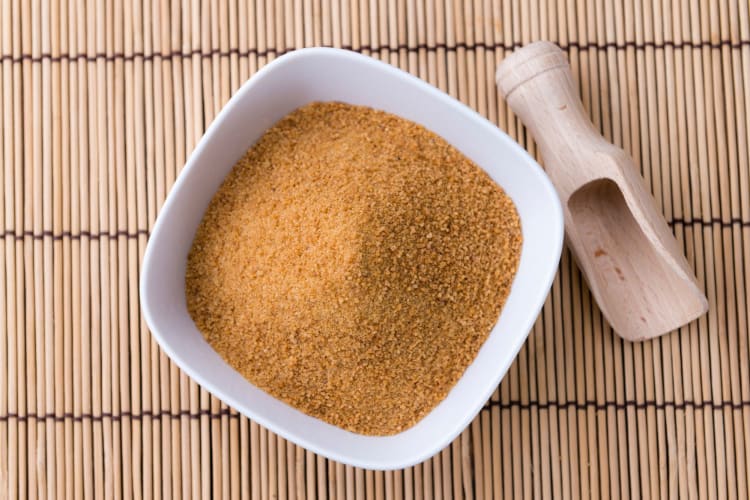
7. Date Sugar
If you’re avoiding refined sugars, date sugar may be a perfect brown sugar replacement. It’s created from dehydrated dates and has a similarly sweet, more caramel-like flavor to brown sugar. Try 2/3 cup of date sugar for every cup of brown sugar for a healthy brown sugar substitute.
Use This: If you want a naturally derived sweetener that can stand in as a great brown sugar substitute. Its rich flavor can enhance cookies, cakes and more, but be prepared for a slightly different texture since it doesn’t melt as smoothly as standard sugar.
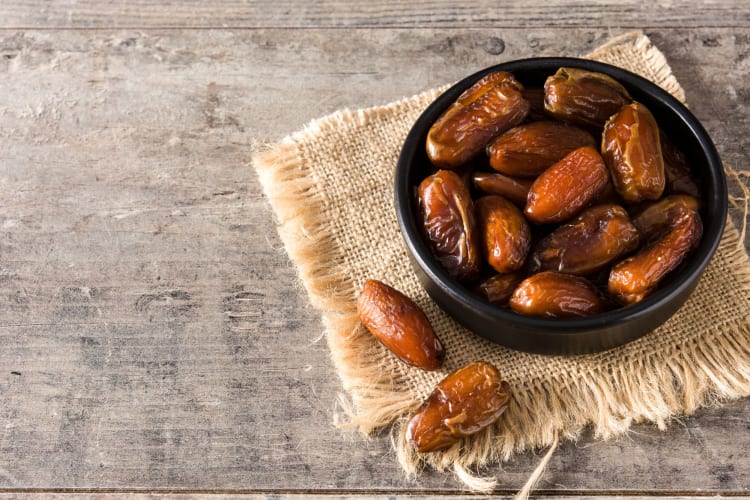
8. Maple Sugar
Another unrefined brown sugar substitute, maple sugar involves crystals culled from maple tree sap. It therefore boasts a flavor similar to that of maple syrup. While not ideal for baking or recipes involving heat, it is perfect as an addition to granola or sprinkled over oatmeal. If you want to use it as a brown sugar substitute, start with a 1:1 ratio and adjust based on your preference.
Use This: If you love the flavor of maple and want a less-refined brown sugar substitute that serves as a topping.
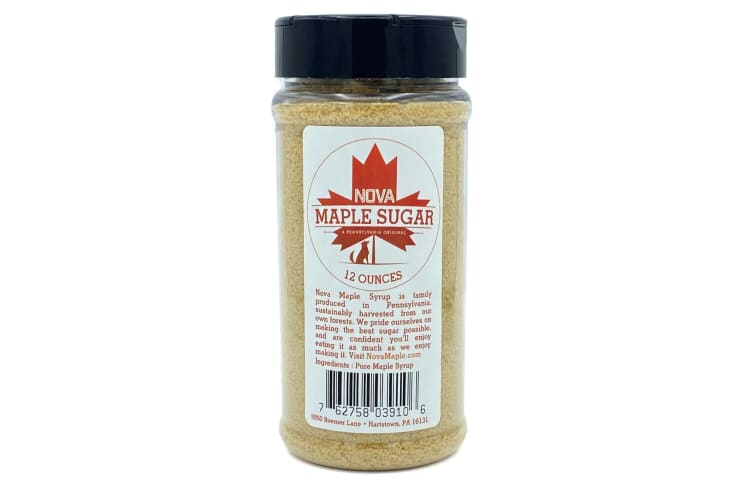
9. Turbinado Sugar
This type of raw sugar is only partially refined, so it retains some natural molasses. This makes it taste a bit like brown sugar — think of it as a milder cousin of muscovado. You can use it in a 1:1 ratio as a brown sugar substitute in many recipes.
Keep in mind that coarser crystals can lead to drier or grainier results when replacing brown sugar in baked goods. To avoid this, try grinding raw sugar into a finer powder or dissolving it in melted butter or other liquids before mixing. This helps retain the moist, chewy texture you’d expect from recipes calling for brown sugar.
Use This: If you’re exploring brown sugar substitutes and need a more natural sweetener
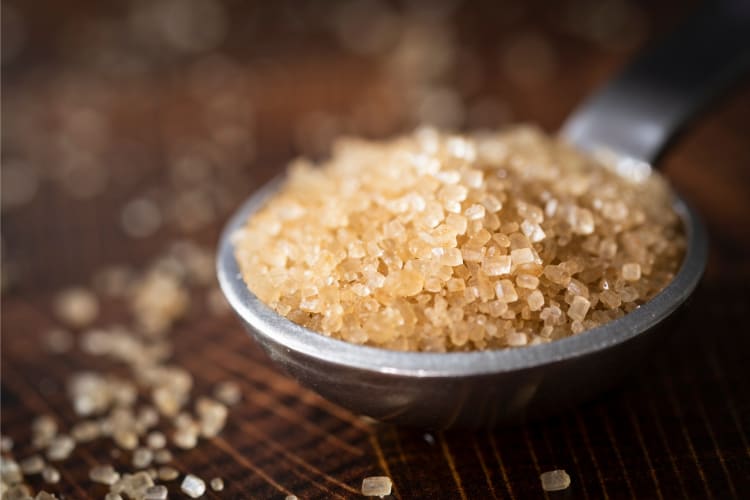
10. Palm Sugar
Palm sugar is an unrefined sweetener derived from the sap of sugar palm trees. While this option for a brown sugar substitute can be trickier to track down, its unique flavor profile makes it worth trying.
For most recipes, you can use palm sugar as a brown sugar substitute in a 1:1 ratio, but be aware that its drier consistency may affect the final texture.
Use This: If you want to experiment with new brown sugar substitutes and don’t mind a bit of extra prep.
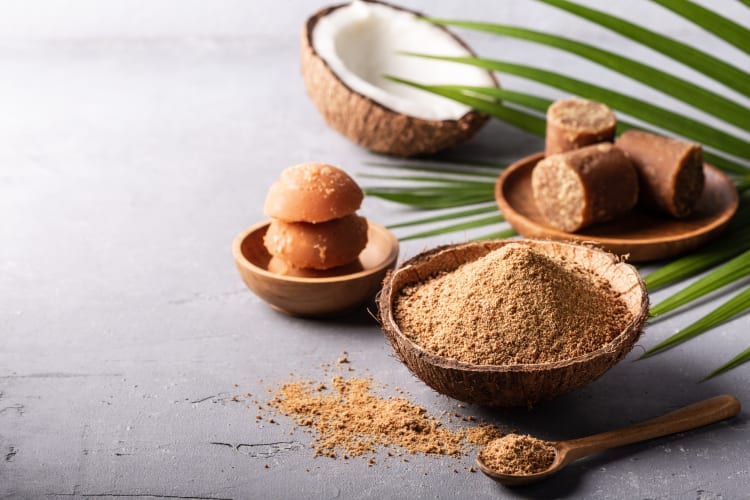
11. Demerara Sugar
Demerara sugar is a type of raw sugar with large, amber-colored crystals and a mild caramel note. If you’re looking for a brown sugar substitute you can use in an equal 1:1 ratio, demerara sugar is a good choice and can be used as a direct swap due to its flavor being similarly sweet.
However, like other raw sugars, demerara is noticeably drier, which can impact moisture levels.
Use This: If you’re seeking brown sugar substitutes that offer a similar depth of flavor. Just remember that demerara’s coarse texture may create a slightly grainy feel in low-moisture bakes.

12. Other Raw Sugars
Beyond turbinado, palm sugar and demerara, you might encounter other unrefined sweeteners like piloncillo (from Mexican sugarcane), panela (common in Latin American cuisine) or jaggery (popular in South Asian recipes). These raw sugars typically boast unique flavor profiles and a deep, molasses-like sweetness.
As with other brown sugar substitutes, you can often swap them in a 1:1 ratio, though their texture (sometimes sold in cones or blocks) means you’ll need extra steps — like grating, chopping or dissolving — to integrate them smoothly into your recipe.
Use This: If you want to explore a range of brown sugar substitutes with distinct regional tastes.

Whatever you are cooking up, brown sugar adds sweetness, chewiness and decadence to your favorite dishes. If you find yourself lacking it in your pantry or are looking for alternatives to refined sugar, trying out these great brown sugar alternatives will surely lead to delicious results.
For even more ways to explore your favorite foods, check out other experiences happening on Cozymeal.
